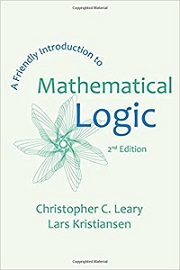
|
FreeComputerBooks.com
Links to Free Computer, Mathematics, Technical Books all over the World
|
|
- Title: A Friendly Introduction to Mathematical Logic
- Author(s) Christopher C. Leary, Lars Kristiansen
- Publisher: Milne Library (January 23, 2019); eBook (2015)
- License(s): CC BY-NC-SA 3.0 US
- Paperback: 380 pages
- eBook: PDF
- Language: English
- ISBN-10/ASIN: 1942341075
- ISBN-13: 978-1942341079
- Share This:

|
At the intersection of mathematics, computer science, and philosophy, mathematical logic examines the power and limitations of formal mathematical thinking. In this expansion of Leary's user-friendly 1st edition, readers with no previous study in the field are introduced to the basics of model theory, proof theory, and computability theory.
The text is designed to be used either in an upper division undergraduate classroom, or for self study. Updating the 1st Edition's treatment of languages, structures, and deductions, leading to rigorous proofs of Gödel's First and Second Incompleteness Theorems, the expanded 2nd Edition includes a new introduction to incompleteness through computability as well as solutions to selected exercises.
About the Authors- Christopher C. Leary is a Distinguished Teaching Professor of Mathematics at SUNY.
- Mathematical Logic - Set Theory, Model Theory, Computability, etc
- Theory of Computation and Computing
- Artificial Intelligence, Machine Learning, and Logic Programming
- Discrete Mathematics

- A Friendly Introduction to Mathematical Logic (Christopher C. Leary)
- The Mirror Site (1) - HTML and PDF
- The Mirror Site (2) - PDF
-
 Incompleteness and Computability: Gödel's Theorems
Incompleteness and Computability: Gödel's Theorems
This book is an introduction to metamathematics and Gödel's Theorems. It covers recursive function theory, arithmetization of syntax, the first and second incompleteness theorem, models of arithmetic, second-order logic, and the lambda calculus.
-
 Introduction to Mathematical Logic (Vilnis Detlovs, et al)
Introduction to Mathematical Logic (Vilnis Detlovs, et al)
This book explores the principal topics of mathematical logic. It covers propositional logic, first-order logic, first-order number theory, axiomatic set theory, and the theory of computability. Discusses the major results of Gödel, Church, Kleene, Rosser, and Turing.
-
 A Concise Introduction to Mathematical Logic (W. Rautenberg)
A Concise Introduction to Mathematical Logic (W. Rautenberg)
This is a well-written introduction to the beautiful and coherent subject of mathematical logic. It contains classical material such as logical calculi, beginnings of model theory, and Goedel's incompleteness theorems, as well as some topics motivated by applications.
-
 Beginning Mathematical Logic: A Study Guide (Peter Smith)
Beginning Mathematical Logic: A Study Guide (Peter Smith)
It introduces the core topics and recommends the best books for studying these topics enjoyably and effectively. An invaluable resource both for those wanting to teach themselves new areas of logic and for those looking for supplementary reading.
-
 A Problem Course in Mathematical Logic (Stefan Bilaniuk)
A Problem Course in Mathematical Logic (Stefan Bilaniuk)
It is intended to serve as the text for an introduction to mathematical logic for undergraduates with some mathematical sophistication. It supplies definitions, statements of results, and problems, along with some explanations, examples, and hints.
-
 Model-Theoretic Logics (Jon Barwise, et al)
Model-Theoretic Logics (Jon Barwise, et al)
This book brings together several directions of work in model theory between the late 1950s and early 1980s. It provides an introduction to the subject as a whole, as well as to the basic theory and examples. Many chapters can be read independently.
-
 Basic Model Theory (Kees Doets)
Basic Model Theory (Kees Doets)
As the title indicates, this book introduces the reader to what is basic in model theory. A special feature is its use of the Ehrenfeucht game by which the reader is familiarised with the world of models.
-
 An Introduction to Set Theory (William A. R. Weiss)
An Introduction to Set Theory (William A. R. Weiss)
This book covers the basics: relations, functions, orderings, finite, countable, and uncountable sets, and cardinal and ordinal numbers, gives students sufficient grounding in a rigorous approach to the revolutionary results of set theory.
-
 Set Theory: An Open Introduction (Richard Zach)
Set Theory: An Open Introduction (Richard Zach)
This book is a brief introduction to the philosophy of set theory. It is written for students with a little background in logic, and some high school mathematics, aims to scratch the tip of the surface of the philosophy of set theory.
-
 Language, Proof and Logic (Jon Barwise, et al)
Language, Proof and Logic (Jon Barwise, et al)
This book covers first-order language in a method appropriate for first and second courses in logic, and is specially useful to undergraduates of philosophy, computer science, mathematics, and linguistics.






